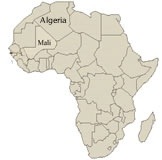Morocco News Board
HASSAN MASIKY

Washington / Morocco News Board— News of White House “secret meetings to examine the threat posed by al-Qaeda’s franchise in North Africa and consider for the first time whether to prepare for unilateral strikes” as reported by the Washington Post in its Tuesday’s edition dispelled Algeria’s attempts to portray the American position in Mali as compatible with Algiers’s.
Since the publication in the Algerian press of General Carter F. Ham, chief of U.S. Africa Command, comments stating that the United States have “no plans for U.S. direct military intervention” in the Sahel, Algerian officials and press have been working feverishly to interpret Washington and London positions in the Malian crisis as being against military intervention in Northern Mali. But as the Washington Post article demonstrates clearly, Algeria stands today alone in the Sahel.
The Algerian Government misread Gen. Ham ‘comments. Unlike the Algerian policy opposing a foreign intervention in Northern Mali, the American position is open to all eventualities including military efforts to neutralize terror groups in the Sahel. In fact, the American military “has been conducting has launched a series of clandestine intelligence missions, including the use of civilian aircraft to conduct surveillance flights and monitor communications over the Sahara Desert and the arid region to the south, known as the Sahel’ according to the Washington Post.
Feeling the heat form public criticism of its military’s handling of the kidnapping of Algerian diplomats by a terror group based in Northern Mali, the Algerian government is trying to convince the Algerian public that Algeria’s appeals have an international backing.
But in a clear rebuff to Algeria’s calls, Bamako and ECOWAS (a regional Block of West African countries) recently agreed on the deployment of African troops to Mali with the help of outside experts including French and Americans. Similarly, during last meeting of the United Nations General Assembly, Niger foreign minister stated during his speech that “only an armed intervention supported by friendly powers could eradicate insecurity in the region.”
Algeria’s wait and see approach in Mali has collapsed, especially in light of the terror attack against the US consulate in Benghazi, the decision by Mali to ask for outside help and the intense French diplomatic efforts to secure the backing of, a reluctant, United Nations for a Military intervention to chase armed groups from Northern Mali.
Algerian setbacks in Sahel stared with the Algerian military failed attempt to form a counter-terrorism front that excluded key countries in North Africa. The Algeria designed and chaired Committee of Joint Staffs (Cémoc)
( also known as the Tamanrasset group that includes Sahel countries and Algeria) has been missing on the diplomatic and military scenes in Mali and is presumed dead. In the other hand, the ECOWAS forces are united in their decision to send forces to secure Northern Mali including the borders with Algeria.
While the Algerian government continues to oppose a military intervention in Mali, its Foreign Minister lacks a non-military alternative to resolving the crisis. Algeria, wary of foreign forces on its borders, lost its influence and political power once it refused to address Mali’s concerns regarding the potential impacts of a lingering Al-Qaeda in the Islamic Maghreb (AQIM) presence on the borders between the two countries.
Because of Algeria’s apprehension about the potential rise of nationalism among its own ethnic Touareg if a Malian Touareg entity survives the current situation, ECOWAS countries view Algerian efforts with misgivings. In a recent candid declaration, the Malian Prime Minister, Cheick Modibo Diarra, criticized his powerful neighbor saying, “Algeria seeks to protect its men, even if it means sacrificing the people of Mali. [Algeria] should not feel obliged to get involved in a military operation; Mali has not asked anything of [Algeria].”
As the United States and France coordinate a balanced and coordinated military action to help regional militaries confront armed groups in Mali and the ECOWAS forces are on standby ready to move on the rebels, Algeria elects to negotiate with Ansar Dine, a group that Algerians and Western observers consider a terror group. The Algerian press has reported in recent days that Algerian Military Intelligence is holding secret meetings with Ansar Dine.
Algeria bipolar and disoriented policy in Mali is a byproduct of Algiers dangerous strategy of “domestication” of” Islamist” armed groups on its soil. AQIM, the chief sponsor of all armed groups controlling Northern Mali, is an Algerian group born in Algeria and exported to Mali. Now, it is the turn of ECOWAS, the French and the American to secure Algerian borders from this Algerian creation.
.






